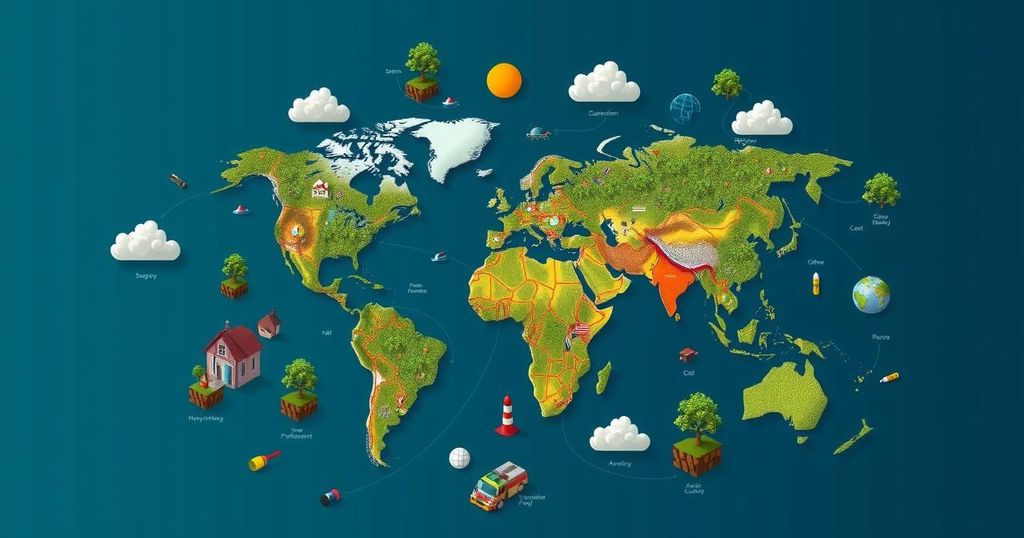As the Bretton Woods institutions celebrate their 80th anniversary, significant challenges threaten global economic stability and poverty reduction, including crises in global commons, the necessity for urgent collective action, and insufficient progress in addressing these issues. The article discusses China’s essential role in climate change mitigation and the necessity for substantial investments to combat climate challenges, while identifying critical gaps in governance, implementation, and accountability that hinder progress. A system-wide approach involving both public and private sectors is crucial for overcoming these hurdles.
The 80th anniversary of the Bretton Woods institutions highlights their pivotal role since World War II in fostering global economic growth and stability. However, as we advance into 2024, three significant challenges threaten the hard-won progress in poverty reduction and living standards: the crisis in global commons, the urgency of collective action, and the slow pace of addressing these pressing issues. The first challenge—the crisis of the global commons—encompasses realms such as climate change, pandemics, and technology, all of which transcend national borders yet detrimentally impact the global economy. Second, the complexities of these challenges demand prompt and cohesive responses, which have not been realized due to increasing fragmentation of the global economy and rising geopolitical tensions, exacerbated by the COVID-19 pandemic. This fragmentation is reflected in the current state of international relations, which deteriorates with each passing year, a trend that has prominent ramifications on economies worldwide. China’s role in combating climate change is particularly notable; as a major contributor to global emissions, it has simultaneously made significant strides in emissions reduction and climate-friendly market strategies that other nations could emulate. Moreover, addressing climate change necessitates sizable investments estimated at $3 to $4 trillion annually, predominantly sourced from domestic revenue mobilization and foreign investment. The analysis identifies three critical gaps impeding progress: governance, implementation, and accountability within both public and private sectors. Notably, while the UN Framework Convention on Climate Change provides a framework, it lacks an overarching body to coordinate comprehensive global climate policies. A potential solution might involve exploring the possibility of creating a new institution to enhance coordination; nonetheless, given the current geopolitical climate, achieving consensus on such a move may prove challenging. In light of recent advancements in technology, we recognize that the feasibility of reducing carbon emissions is within reach, shifting the focus towards expeditious action that is equitable and impactful. To mobilize the necessary private sector involvement, robust initiatives such as global carbon trading schemes, the promotion of nature-based solutions in carbon reduction strategies, and implementing cross-border carbon taxes are imperative. The International Monetary Fund and World Bank should play a substantial role in fostering global carbon markets and developing efficient carbon tax systems. Furthermore, the need for accountability is paramount, as the current voluntary disclosure system lacks the rigor for verification; thus, establishing regulations to ensure consistency in mandatory sustainability reports and financial statements is critical.
The article addresses the urgent need for a unified global effort to combat climate change, emphasizing the historical significance of the Bretton Woods institutions in fostering economic growth post-World War II. It elaborates on three pressing challenges that threaten the achievements in global poverty reduction and living standards, particularly focusing on crises that transcend national borders, like climate change. The context also highlights the geopolitical tensions and fragmentation that have arisen in the international landscape, particularly following significant events such as the COVID-19 pandemic and the conflict in Ukraine. It underscores the critical contribution of China in addressing climate issues and highlights the essential financial resources required to effectuate comprehensive climate action. Lastly, it points out the existing gaps in governance, implementation, and accountability that need bridging for effective solutions.
In conclusion, the path forward in combating climate change necessitates a comprehensive, system-wide approach that encompasses both public and private sectors. Bridging the critical gaps of governance, implementation, and accountability will be essential for the efficacy of climate strategies. Moreover, leveraging the collaborative strengths of institutions like the IMF and World Bank, alongside innovative market solutions, is vital for mobilizing the considerable financial resources required. The complexity of the climate crisis demands urgent collective action in order to secure a sustainable future for generations to come.
Original Source: global.chinadaily.com.cn







